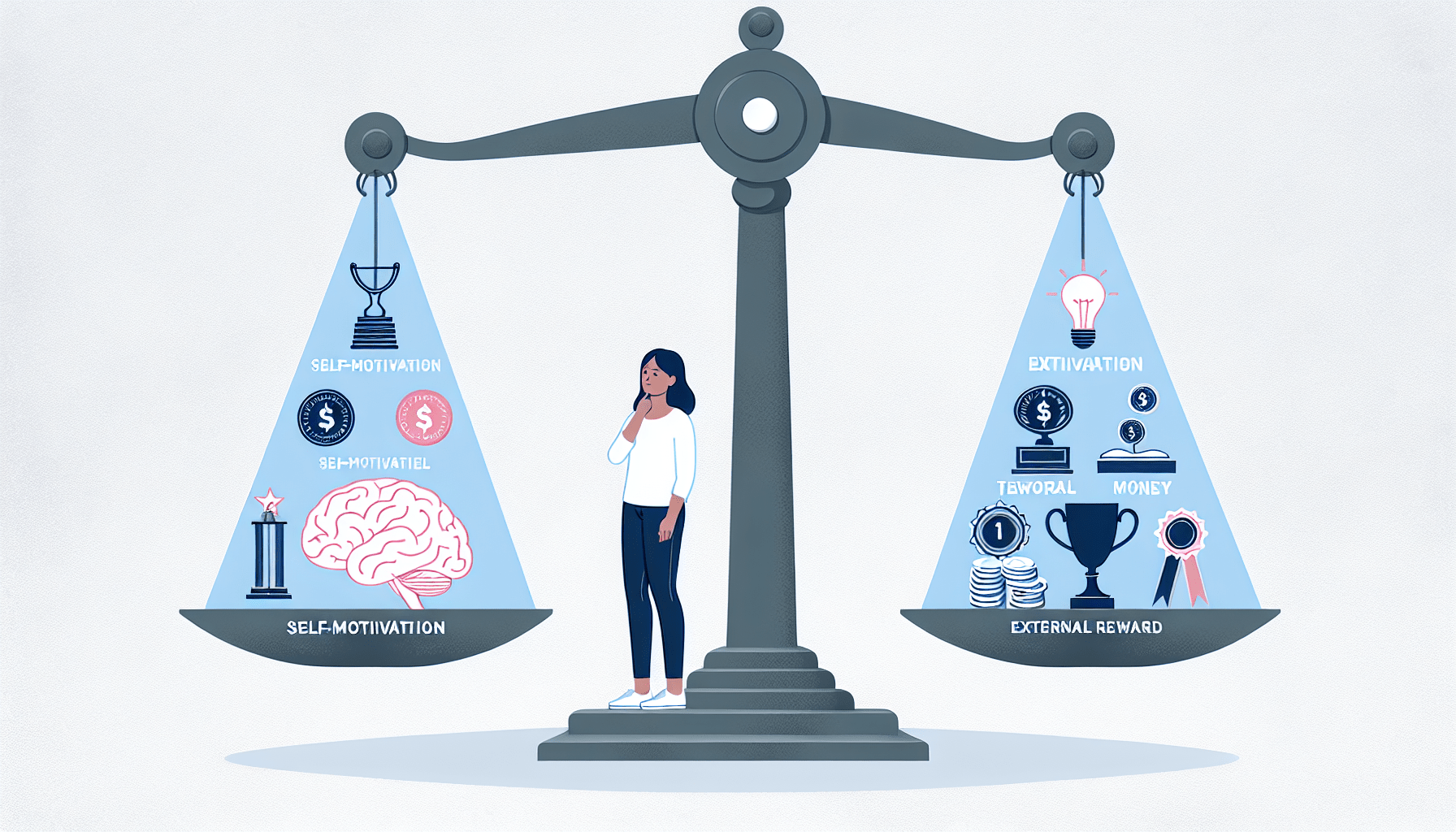Self-motivation Vs External Motivation: Which Is Better?
In the eternal quest for motivation, there are two contenders that often come face to face: self-motivation and external motivation. While self-motivation arises from within, driven by personal goals and desires, external motivation relies on external factors such as rewards, recognition, or the influence of others. Both have their merits, but which is truly better? In this article, we will explore the intricacies of self-motivation and external motivation, highlighting their strengths, weaknesses, and the impact they can have on your success. So, buckle up and embark on this enlightening journey to discover which type of motivation reigns supreme.
Benefits of Self-Motivation
Increased Sense of Ownership
When you are self-motivated, you take full responsibility for your actions and outcomes. You have a deep sense of ownership and pride in the work you do because it comes from within. This heightened sense of ownership can lead to increased productivity and a stronger commitment to achieving your goals.
Greater Persistence and Determination
Self-motivation fuels persistence and determination. When you are motivated from within, you are more likely to keep pushing forward even in the face of challenges and setbacks. You have the drive to overcome obstacles and the resilience to bounce back from failures. This unwavering determination can be a powerful tool in achieving long-term success.
Flexibility and Adaptability
Self-motivation fosters flexibility and adaptability in navigating life’s uncertainties. When you are motivated by your own values and desires, you are more open to embracing change and trying new things. You are willing to step outside of your comfort zone and take risks, which can lead to personal growth and new opportunities.
Enhanced Creativity and Innovation
Self-motivation stimulates creativity and innovation. When you are driven by your own passions and interests, you are more likely to think outside the box and come up with unique solutions to problems. You are not bound by external constraints or expectations, allowing your creativity to flourish. This can lead to groundbreaking ideas and advancements in various fields.
Benefits of External Motivation
Clear Goals and Guidance
External motivation provides clear goals and guidance. When you receive motivation from external sources such as mentors, coaches, or supervisors, they can provide you with specific objectives to work towards. This clarity helps you stay focused and ensures that you are moving in the right direction.
Sense of Accountability
External motivation fosters a sense of accountability. When you have someone holding you accountable for your actions, you are more likely to stay committed to your goals. Whether it’s a friend, a mentor, or a team, the knowledge that others are relying on you can push you to perform at your best and meet your responsibilities.
Support and Encouragement
External motivation offers support and encouragement. When you surround yourself with motivated individuals or seek guidance from mentors, you benefit from their expertise and experience. They can provide you with valuable advice, feedback, and encouragement, which can boost your confidence and motivation.
Access to Resources and Opportunities
External motivation provides access to resources and opportunities that may otherwise be unavailable to you. Whether it’s through networking, mentorship programs, or collaboration with others, external motivation can open doors and expose you to new ideas, skills, and experiences. This exposure can broaden your horizons and contribute to your personal and professional growth.

Disadvantages of Self-Motivation
Lack of External Validation
One disadvantage of self-motivation is the lack of external validation. When you are solely relying on your own motivation, there may be times when you doubt your abilities or question the significance of your accomplishments. Without external validation, it can be challenging to stay motivated and maintain confidence in your own abilities.
Potential for Burnout
Being solely self-motivated can also increase the potential for burnout. When you are constantly pushing yourself and setting high expectations, it can be easy to become overwhelmed and exhausted. Without the support and guidance from others, there is a risk of pushing yourself too hard and neglecting self-care, leading to burnout.
Limited Perspective
Self-motivation may lead to a limited perspective. When you are solely focused on your own goals and desires, it can be challenging to see the bigger picture or consider alternative viewpoints. This narrow focus may limit your ability to collaborate effectively with others and hinder your personal growth.
Emotional Drain
Self-motivation can sometimes be emotionally draining. The pressure of constantly motivating oneself and maintaining high levels of productivity can take a toll on your mental and emotional well-being. It can be exhausting to always be in charge of your own motivation and constantly pushing yourself to perform.
Disadvantages of External Motivation
Dependency on Others
One disadvantage of external motivation is the dependency on others. When you rely solely on external sources for motivation, you become dependent on their presence and support. If that support is withdrawn or unavailable, it can lead to a loss of motivation and hinder your progress towards your goals.
Lack of Autonomy
External motivation can limit your autonomy. When you are constantly seeking approval or guidance from others, it may hinder your ability to trust your own instincts and make independent decisions. This lack of autonomy can hinder your personal growth and hinder your ability to take risks and learn from mistakes.
Loss of Motivation when External Support is Withdrawn
External motivation can also lead to a loss of motivation when the external support is withdrawn. If you have been relying heavily on external validation or encouragement, the absence of that support can leave you feeling unmotivated and lost. This dependence on external motivation may not provide a sustainable source of drive and determination.
Potential for Distrust and Manipulation
External motivation can sometimes come with the potential for distrust and manipulation. When you rely too heavily on others for motivation, there is a risk of being influenced by their agendas or priorities. This can lead to a lack of authenticity and compromise your own values and goals.

The Interplay Between Self-Motivation and External Motivation
Complementary Role in Achieving Goals
Both self-motivation and external motivation have a complementary role in achieving goals. Self-motivation serves as the internal drive that fuels your passion and determination. External motivation provides the guidance, support, and resources needed to navigate challenges and stay on track towards your goals. By leveraging both types of motivation, you can enhance your chances of success.
Balancing and Blending the Two Types
Finding the right balance and blending self-motivation and external motivation is key. While self-motivation provides the internal drive, external motivation offers the necessary support and guidance. By striking a balance, you can benefit from the strengths of both types of motivation and maximize your chances of achieving your goals.
Recognizing the Need for both Types of Motivation
It is essential to recognize and acknowledge the need for both self-motivation and external motivation. Each type of motivation has its own advantages and drawbacks, and no one type is inherently better than the other. Understanding your own needs and preferences can help you determine which type of motivation is most effective for a particular situation or goal.
Situations Favoring Self-Motivation
Intrinsic Interest in the Task
Self-motivation is favorable when you have a genuine intrinsic interest in the task at hand. When you find enjoyment and fulfillment in the work you do, self-motivation naturally arises. This intrinsic interest provides a strong foundation for motivation and can lead to higher levels of engagement and productivity.
Personal Growth and Development
Self-motivation is beneficial for personal growth and development. When you have a desire to improve yourself and acquire new skills or knowledge, self-motivation becomes a driving force. It encourages you to seek out opportunities for growth, take on challenges, and continuously learn and improve.
Challenging and Creative Endeavors
Self-motivation is particularly advantageous for challenging and creative endeavors. When you are working on complex or innovative projects that require thinking outside the box, self-motivation fuels your creativity and determination. It allows you to tap into your full potential and come up with unique solutions.
Long-Term Goals
Self-motivation is well-suited for long-term goals. When you are working towards a goal that requires sustained effort and dedication over an extended period, self-motivation is crucial. It provides the internal drive and stamina needed to stay committed and overcome obstacles along the way.
Situations Favoring External Motivation
Clear Instructions and Expectations
External motivation is beneficial when clear instructions and expectations are provided. In situations where you need explicit guidance on what needs to be accomplished, external motivation can offer the clarity and direction necessary for success.
Short-Term Goals and Deadlines
External motivation is particularly useful for short-term goals and deadlines. When you have a specific task or project with a defined timeframe, external motivation can help you stay focused and meet the established deadlines. The external accountability and support can be instrumental in achieving short-term objectives.
Collaborative Projects
External motivation excels in collaborative projects. When you are working with a team towards a common goal, external motivation can foster a sense of unity and coordination. It encourages collaboration, cooperation, and mutual support, leading to enhanced teamwork and successful outcomes.
Tasks Requiring Specific Skills
External motivation is advantageous for tasks that require specific skills or expertise. When you are engaged in activities outside your area of expertise, seeking external motivation from mentors or experts can provide you with the guidance and support needed to excel in those tasks.
Developing Self-Motivation Skills
Setting S.M.A.R.T. Goals
Setting S.M.A.R.T. (Specific, Measurable, Achievable, Relevant, Time-bound) goals is a powerful self-motivation technique. By setting clear and realistic objectives, you provide yourself with a roadmap towards success. S.M.A.R.T. goals allow you to break down larger goals into manageable steps and provide a sense of direction and purpose.
Creating Intrinsic Rewards
Creating intrinsic rewards can boost self-motivation. Find ways to make the task or goal inherently rewarding by focusing on the enjoyable aspects or personal growth opportunities it offers. Celebrate small milestones along the way and recognize your achievements, providing yourself with a sense of accomplishment and motivation to keep going.
Building a Growth Mindset
Adopting a growth mindset is crucial for cultivating self-motivation. Embrace the belief that your abilities and intelligence can be developed through hard work and dedication. View challenges as opportunities for growth rather than roadblocks, and approach setbacks as learning experiences. A growth mindset fosters resilience and tenacity in the face of adversity.
Fostering Passion and Curiosity
Fostering passion and curiosity fuels self-motivation. Find activities or projects that align with your passions and interests. Cultivate a sense of curiosity and the desire for lifelong learning. Engaging in tasks that spark your curiosity and ignite your passion will naturally drive your motivation and enthusiasm.
Leveraging External Motivation Effectively
Seeking Supportive Networks
Building supportive networks can provide external motivation. Surround yourself with individuals who share similar goals and values, and who can provide encouragement and constructive feedback. Seek out mentors, coaches, or accountability partners who can offer guidance, support, and accountability on your journey.
Accountability Systems
Implementing accountability systems can enhance external motivation. Set up mechanisms that hold you accountable for your actions and progress towards your goals. This can be done through regular check-ins with a mentor, joining a mastermind group, or utilizing productivity tools and apps that track your progress.
Recognizing and Utilizing External Rewards
External rewards can be a powerful source of motivation. Identify the external rewards that resonate with you, such as recognition, financial incentives, or career advancement opportunities. Set milestones or targets that, when achieved, trigger these rewards. By leveraging external rewards, you can motivate yourself to consistently perform at your best.
Seeking Role Models and Mentors
Role models and mentors can provide valuable external motivation. Look for individuals who have achieved success in your desired field or who possess skills and qualities you admire. Learn from their experiences, seek their guidance, and emulate their strategies for success. Having someone to look up to and learn from can inspire and motivate you to reach new heights.
Conclusion
In the debate between self-motivation and external motivation, both have their advantages and disadvantages. Self-motivation brings a heightened sense of ownership, persistence, adaptability, and creativity. External motivation provides clear goals, accountability, support, and access to resources. Recognizing the interplay between the two can lead to a balanced approach in achieving your goals. Situations favoring self-motivation include intrinsic interest, personal growth, challenging endeavors, and long-term goals. On the other hand, external motivation shines in situations with clear instructions, short-term goals, collaborative projects, and tasks requiring specific skills. Developing self-motivation skills involves goal-setting, creating intrinsic rewards, building a growth mindset, and fostering passion. Leveraging external motivation effectively includes seeking support networks, implementing accountability systems, recognizing external rewards, and seeking role models. Ultimately, understanding the value of both types of motivation and finding the optimal balance is key, all while being mindful of individual differences.






